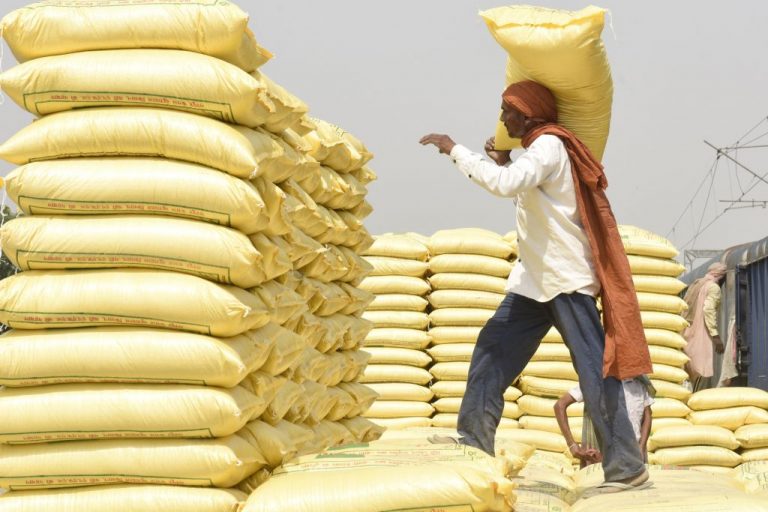The threat of worldwide starvation looms as food prices soar and fertilizer scarcity continues, which according to some, carries the opportunity to restructure the economy, agriculture, and everyday life.
According to a report by the International Food Policy Research Institute (IFPRI), prices for nitrogen, phosphorus, and potassium (NPK) based fertilizers rose by 125 percent in January compared to 2021 and increased another 17 percent between January and March.
“While risks around fertilizer availability and affordability risks will vary by country and region, farmers in many low-income countries face potential hardship as the Ukraine crisis continues,” the report stated.
“If these challenges are not addressed, harvests will suffer, keeping pressure on food prices beyond the short run and adding to food security concerns in many developing countries.”
READ MORE:
- US Rail Carriers Are Cutting Fertilizer, Grain, Coal Shipments
- Shrinkflation In Pictures: IKEA Canada’s New Line of Tealights Is 17% Smaller For the Same Great Price
- Farmers in China’s Breadbaskets Desert Crops to Comply With ‘Zero-COVID’ Restrictions
- How Fertilizer Shortages Are Impacting European Food Prices
The report lists a number of binds leading to the current crisis for raw materials; Hurricane Ida in the U.S., a post-pandemic hike in the market, supply chain congestion, and steadily rising gas prices before and after the Ukrainian conflict.
Putin did it
Success
You are now signed up for our newsletter
Success
Check your email to complete sign up
U.S. President Joe Biden and his unelected EU counterpart Ursula von der Leyen issued a letter to EU officials expressing similar wordings by saying:
“We are deeply concerned by how Putin’s war in Ukraine has caused major disruptions to international food and agriculture supply chains and the threat it poses to global food security,” the Joint Statement read.
“We recognize that many countries around the world have relied on imported food staples and fertilizer inputs from Ukraine and Russia, with Putin’s aggression disrupting that trade,” the duo stated in unison.
Strangely, even though the leaders are fully aware of the looming mass famine, and they know exactly what causes these disasters, they appear to be doing nothing to stop it.
On the contrary, worldwide governments keep pushing for stauncher measures against Russia, such as banning oil and gas imports, while cutting down on their own production in favor of costlier and less yielding biofuels, only to exacerbate the crisis.
The USDA’s Foreign Agriculture Service also weighed in during an April report on the Ukraine conflict’s impact on food shortages, stating, “For agricultural producers around the world, high fertilizer and fuel prices are a major concern.”
The report is dubbed The Ukraine Conflict and Other Factors Contributing to High Commodity Prices and Food Insecurity, and inherently shifts the blame to the Ukraine conflict and Vladimir Putin.
According to Max Gagliardi, an oil and gas industry commentator and entrepreneur, the cause of the sky-rocketing fertilizer prices is a bit more complicated.
“It’s a combination of record demand domestically and from LNG (liquid natural gas) exports combined with less than expected supply, in part due to the starving of capital for the O&G (oil and gas) industry due to the ESG (environmental, social, and corporate governance principles) / green movement pressures on capital providers, plus pressure from Wall Street to spend less capital and return value to shareholders,” Gagliardi told The Epoch Times.
Never let a crisis go to waste
“Big Oil is price gouging American drivers. These liars do nothing to make the United States energy independent or stabilize gas prices. It’s time we break up with Big Oil and ignite a clean energy revolution,” Sen. Ed Markey (D-MA) said on Twitter in March.
Markey is right about it—theoretically, at least—dumping oil is just what the definition of clean energy would be. Others saw the “crisis” as an opportunity to ditch gas and oil for more “sustainable” energy sources.
To former Joe Biden aide Lindy Li, the crisis provides a small window of opportunity, “I say we take this opportunity to double down on our renewable energy investments and wean ourselves off of planet-destroying fossil fuels,” Li commented on Twitter after ExxonMobil announced to retreat from Russia’s Siberian oil projects.
“Never let a crisis go to waste,” Li added.
The way Li described how the food crisis could help promote a particular agenda brings to mind how Samantha Power, a former UN ambassador during the Obama Administration, used the exact same wordings in a May 1 ABC interview with former Democratic advisor George Stephanopoulos.
“Less fertilizer is coming out of Russia. As a result, we’re working with countries to think about natural solutions, like manure and compost. And this may hasten transitions that would have been in the interest of farmers to make anyway. So, never let a crisis go to waste,” Power said.
According to Mandy Gunasekara, an environmental attorney with the Environmental Protection Agency under former President Trump, Power’s words reflect an ulterior agenda.
“It’s always been part of their plan to make the price of traditional energy sources go up, so then wind and solar could actually compete with them,” Gunasekara told The Epoch Times.
Marc Morano, owner of the Climate Depot website, went even further, “A food crisis/famine advances the long-term goal of more centralized control of energy, food, transportation, etc., as advanced by the Davos crowd of the WEF.”
“Governments must expand their powers to ‘handle’ crises, and that is what progressives love more than anything,” he told the outlet.

















